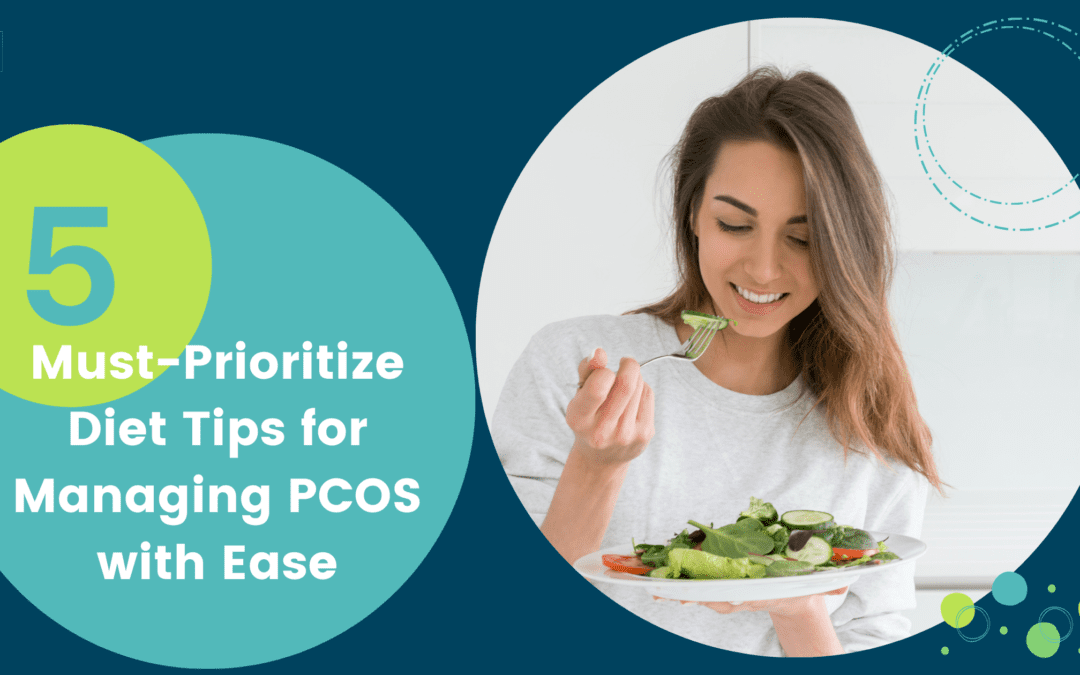Managing Polycystic ovary syndrome (PCOS)with Diet:
Polycystic ovary syndrome (PCOS) is a hormonal disorder that affects 1 in 10 women, making it one of the most common hormonal disorders in women of reproductive age. Polycystic ovary syndrome can lead to infertility, weight gain, insulin resistance, acne, and hair growth. However, the good news is that you can manage PCOS with a healthy lifestyle, diet, and natural supplements. In this blog, we share five crucial things that you need to prioritize in your diet to manage PCOS with ease.
Maintain your meal timings
One of the most important things that you can do for your body is to maintain regular meal timings. As dietitian, Rupali Karajgir suggests, “You have to take care of your body. No one else can come and take care of your meal timings.” She emphasizes the need to have frequent meals at the same time every day, with healthy munching in between. This helps your hormones to function better and takes care of other stomach-related issues as well. Studies have shown that women who maintain regular meal timings have better insulin sensitivity, weight management, and hormone regulation.
Take fennel seeds after every meal
Fennel seeds (Saunf) are a small thing but can be very helpful in taking care of your sugar cravings. Women with PCOS often experience food cravings, especially for sugary foods. By taking fennel seeds after every meal, you can delay your sugar cravings. Recent studies have also shown that 1 tsp of fennel seeds post-lunch and 1 tsp post-dinner can reduce FSH/LH/testosterone, resulting in regular menstrual cycles. Fennel seeds are also a good source of antioxidants, which reduces oxidative stress and menstrual pain found in Polycystic ovary syndrome.
Increase your dietary fibers intake
Dietary fibers intake is crucial for everyone, especially for women with Polycystic ovary syndrome. As dietitian, Rupali Karajgir recommends, “You have to increase your dietary fibers intake. With every major meal (especially lunch and dinner), you must have one full bowl of salads. This will take care of your dietary fibers intake. Indian diet is cereal-based. We need to use flour with bran. Use millets in your diet.” By increasing your dietary fibers intake, you can improve your digestion and manage your weight. Dietary fibers-rich foods like whole grains, fruits, and vegetables help in reducing insulin resistance, inflammation, and other metabolic issues.
Prioritize fresh food over processed food
Women with Polycystic ovary syndrome should prioritize fresh food over processed food. Processed foods, including bakery items, biscuits, ketchup, juices, chips, and pickles, are harmful to your health, especially when you have Polycystic ovary syndrome. Instead of consuming fruit juices, have the whole fruit to get the best benefits out of it. Eating fresh food helps you manage your weight and hormonal imbalances. Whole foods are rich in antioxidants, dietary fibers, and nutrients that your body needs to function optimally.
Take more fluids and a mood-uplifting diet
Mood swings are a common symptom of Polycystic ovary syndrome. To tackle mood swings, you can try taking more fluids and having a mood-uplifting diet. Fruits, vegetables, natural sharbat like Bel Sharbat and Nimbu Sharbat (Lemonade), and natural fluids like coconut water or even sometimes coffee (in limited quantity) are mood-uplifting things that take care of your mood swings. Don’t forget to have proper exercise with all of the above. Exercise helps in reducing stress, improving insulin sensitivity, and overall well-being.
In conclusion, Polycystic ovary syndrome is a hormonal disorder that affects many women worldwide. However, it is a manageable condition with a healthy lifestyle, diet, and natural supplements. Prioritizing regular meal timings, taking fennel seeds after meals, increasing dietary fibers intake, prioritizing fresh food over processed food, and taking more fluids and a mood-uplifting diet can help you manage the symptoms of Polycystic ovary syndrome. These lifestyle changes, combined with proper exercise and natural supplements like Sushumna P, can help you lead a healthier life with PCOS. Remember that PCOS is a lifestyle disorder, and by making healthy lifestyle choices, you can start to reverse the symptoms and improve your overall well-being.
Polycystic ovary syndrome (PCOS) is a hormonal disorder that affects 1 in 10 women, making it one of the most common hormonal disorders in women of reproductive age. Polycystic ovary syndrome can lead to infertility, weight gain, insulin resistance, acne, and hair growth. However, the good news is that you can manage PCOS with a healthy lifestyle, diet, and natural supplements. In this blog, we share five crucial things that you need to prioritize in your diet to manage PCOS with ease.
